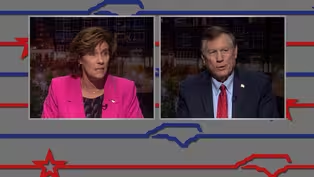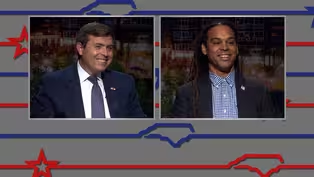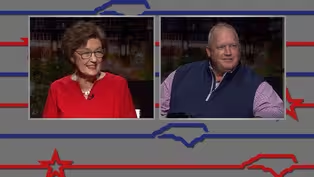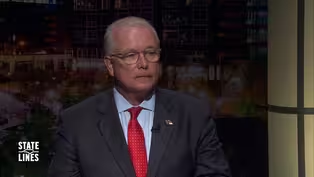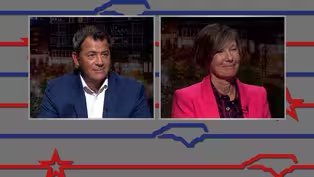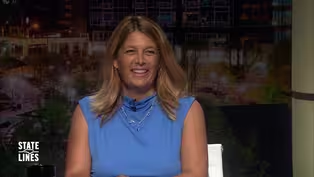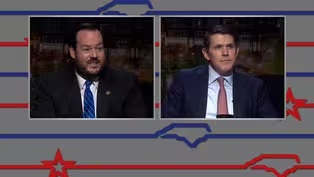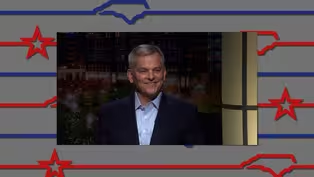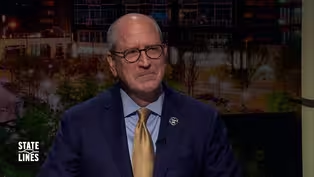
2024 NC Commissioner of Agriculture Candidates
Special | 26m 46sVideo has Closed Captions
Sarah Taber (D) and Steve Troxler (R) discuss their campaigns for NC Commissioner of Agriculture.
Candidates Sarah Taber (Democrat) and Steve Troxler (Republican) discuss their campaigns for NC Commissioner of Agriculture. Hosted by PBS NC’s Kelly McCullen, these interviews were recorded on July 31 and August 12, 2024.
Problems playing video? | Closed Captioning Feedback
Problems playing video? | Closed Captioning Feedback
State Lines is a local public television program presented by PBS NC

2024 NC Commissioner of Agriculture Candidates
Special | 26m 46sVideo has Closed Captions
Candidates Sarah Taber (Democrat) and Steve Troxler (Republican) discuss their campaigns for NC Commissioner of Agriculture. Hosted by PBS NC’s Kelly McCullen, these interviews were recorded on July 31 and August 12, 2024.
Problems playing video? | Closed Captioning Feedback
How to Watch State Lines
State Lines is available to stream on pbs.org and the free PBS App, available on iPhone, Apple TV, Android TV, Android smartphones, Amazon Fire TV, Amazon Fire Tablet, Roku, Samsung Smart TV, and Vizio.
Providing Support for PBS.org
Learn Moreabout PBS online sponsorshipMore from This Collection
During major election cycles, PBS North Carolina's public affairs team sits down for in-depth conversations with candidates running for Governor and Council of State positions. PBS North Carolina has invited major party candidates to a one-on-one interview with State Lines host and executive producer Kelly McCullen. Interviews are scheduled throughout the summer.
2024 NC Commissioner of Insurance Candidates
Video has Closed Captions
Mike Causey (R) and Natasha Marcus (D) discuss their campaigns for NC Commissioner of Insurance. (26m 46s)
2024 NC Commissioner of Labor Candidates
Video has Closed Captions
Luke Farley (R) and Braxton Winston II (D) discuss their campaigns for NC Commissioner of Labor. (26m 46s)
2024 NC Secretary of State Candidates
Video has Closed Captions
Elaine Marshall (D) and Chad Brown (R) discuss their campaigns for NC Secretary of State. (26m 46s)
Jessica Holmes, Democratic Candidate for NC Auditor
Video has Closed Captions
An interview with Jessica Holmes, Democratic candidate for NC Auditor (2024). (12m 32s)
Dave Boliek, Republican Candidate for NC Auditor
Video has Closed Captions
An interview with Dave Boliek, Republican candidate for NC Auditor (2024). (12m 58s)
2024 NC Lieutenant Governor Candidates
Video has Closed Captions
Hal Weatherman (R) and Rachel Hunt (D) discuss their campaigns for NC Lieutenant Governor. (26m 46s)
Michele Morrow, Republican Candidate for NC Superintendent of Public Instruction
Video has Closed Captions
An interview with Michele Morrow, GOP candidate for NC Superintendent of Public Instruction (2024). (12m 57s)
Maurice "Mo" Green, Democratic Candidate for NC Superintendent of Public Instruction
Video has Closed Captions
An interview with Mo Green, Democratic candidate for NC Superintendent of Public Instruction (2024). (13m 7s)
Video has Closed Captions
Wesley Harris (D) and Brad Briner (R) discuss their campaigns for NC Treasurer. (26m 46s)
Video has Closed Captions
Josh Stein (D) discusses his campaign for NC Governor. (26m 46s)
Jeff Jackson, Democratic Candidate for NC Attorney General
Video has Closed Captions
An interview with Jeff Jackson, Democratic candidate for NC Attorney General (2024). (12m 50s)
Dan Bishop, Republican Candidate for NC Attorney General
Video has Closed Captions
An interview with Dan Bishop, Republican candidate for NC Attorney General (2024). (12m 44s)
Providing Support for PBS.org
Learn Moreabout PBS online sponsorship- Meet the Republican and Democrat nominees for North Carolina Commissioner of Agriculture on this special election 2024 edition of "State Lines".
[bright exciting music] Hello, I'm Kelly McCullen.
This "State Lines" special will introduce us to candidates for North Carolina's Commissioner of Agriculture.
This is an elective position first created way back in 1877.
Four year terms for anyone who can win it, no term limits.
And joining us now in the Democratic candidate for Commissioner of Agriculture, Dr. Sarah Taber.
Dr. Taber, thanks for coming on to "State Lines" to explain why now is the right time to run for Commissioner of Agriculture.
That'll be your first question.
Why now?
- Of course, well thank you for having me, first off, and why now?
We've had the same person in this office for 20 years, and North Carolina's now leading the country in farmland loss.
It's been blamed on a lot of things, but what I see, because I've worked with farmers on their business for a long time, what I see is the farmers here can make as little as half as much as their peers in Virginia, in Georgia, right?
So that tells you we've got a problem.
And it's not weather, it's not soil, it's not agribusiness, because those are pretty similar in those places.
There's something here in our state, and I put that up to leadership.
We have folks who don't know what their options are, aren't able to build their businesses effectively, and that's causing us some real problems.
It is time for change in leadership.
- Tell us about your background.
What expertise would you bring to the office of Commissioner of Agriculture?
- Sure.
So I've worked in agriculture for 27 years, and worked my way up from manual labor in the fields, and just worked on up from there.
I was able to work my way through crop school, was very fortunate to do that.
And with that combination of that hands-on experience, for years, and that scientific training, I was able to start working with farmers one on one, again, to help them with their business model.
Farmers are already working hard.
We wanna make sure that that hard work is paying the bills, right?
So we have to build a business, growing things that are gonna make more money, and sometimes if a crop makes more money, it is trickier to grow, so you need a little bit of help to make sure that when you make that change as a farm, you stick that landing, and you're able to really make that money and make that revenue work for you.
- How are farms changing without turning over the farm land to development?
- Sure.
Again, there's different crops make different amounts of money, right?
And so the number one change that we wanna do in order to make sure that farmers can stay in business is grow those things and make more money.
And again, they're trickier, they're more complicated.
Right now, we grow a lot of corn, soy, cotton, tobacco.
Those crops really made sense for us financially to grow 20 or 30 years ago.
But so many things have changed since then.
And we need to help farmers keep up, so.
- I've noticed on your website, you're a big proponent of increasing the fruit and vegetables, and also growing, I guess, trees for nuts, and doing nut butters and things of that nature.
Explain that process, because the ag industry is continually growing, even if farmland is shrinking.
Someone's being more efficient, but you say we can go into different crops.
What are we not growing we ought to be growing?
- Sure.
So first off, I wanna address the idea that the North Carolina farm economy is growing.
We get numbers, I think the current one is $111 billion worth of farm production.
That's not true.
Our farm production is actually more in the neighborhood of 20 billion.
So how do we get to 111 out of that number?
We're counting a lot of things that aren't actually agriculture.
One of them, my favorite, is retail.
We're counting every piece of food and clothing sold in the state of North Carolina as part of our farm economy, even if it wasn't grown or made here.
So we're counting urban retail sales as part of our farm economy, right?
And so we actually have a big mismatch between the numbers tell us we're doing really well because our urban economy is growing, and what's actually happening in our farm sector is not that.
When actually, I'm talking with rural North Carolinians, I will ask people.
According to those numbers, according to that 111 billion, if that's true, then our farm sector has doubled in size in the last 20 years.
So I always ask people.
Raise your hand if it feels like your local economy, the farm economy, has doubled in size in the last 20 years.
No one has raised their hand yet.
Lot of people laugh.
They know that's not right.
It's only folks who are kind of disconnected from agriculture, they're getting fooled by those numbers.
And I think that's a real problem with our leadership, if they have to mislead in order to look like they're doing a good job.
So we're actually having a lot of missed opportunities here in our farm economy, that's part of the problem I'm addressing, with getting into crops that make more money.
North Carolina's a really special place where you can grow almost anything.
And that includes crops that make a lot more money.
Yeah.
- What's one, I remember- - Sure, yeah.
- Farmers started growing the cannabis with the CBD oil.
I think that market's kinda come and gone, or it's very well saturated.
- Yeah.
- What else is out there that's, there's nothing, there's not an easy buck out there, but a more lucrative effort for the amount of time you're gonna spend farming?
- Right.
So I tell people corn and soy, they're gonna make you about 400, maybe $800 an acre.
That's down here.
Something like tobacco is gonna make you three to $4000 an acre, so almost a 10 times difference.
So you can see why people get really excited about farming tobacco, why it's such a big thing here in North Carolina.
But did you know strawberries and tomatoes, which are not an exotic crop, they're just a normal fruit and veggie, they can make you $40,000 an acre gross, right?
So you still have to pay your bills out of that, but you get a lot more money to start with.
That's, by the way, four zero thousand, not one four thousand.
That's four zero thousand dollars per acre.
So that's quite a bit more than corn, soy, and tobacco.
So that's not getting into anything exotic.
That's just plain old strawberries and tomatoes.
A lot of fruits and veggies are just gonna make a lot more money per acre, so things like leafy greens, again, strawberries, tomatoes, any kind of berries, melons, blueberries, a lot of things just make way more money, and we have urban markets in the northeast, right, that have almost a bottomless demand for food.
Right now, they're getting that from California, but California's running out of land and water.
North Carolina, because we're a special place where you can grow almost anything, a lot of what we're growing in California for fruits and veggies right now would transfer quite well to out here.
Hazelnuts is another example, pecans can do a lot of the things that we're using almonds for right now, so we can do that and save water, right?
Compared to California having to irrigate them quite a bit.
So there's a lot to be gained, both for the West Coast is saving water, by transferring some of those crops here, and also it's a huge business win for us here in North Carolina, because again, those crops make so much more money than what we're currently growing.
- How much influence do you think you could have as Agricultural Commissioner, or how would you gain the influence with farmers to walk away from crops that may not pay as much, but are stable and reliable family raisers, how do you do that using a government position when this is strictly, for the most part, a zoning and a private sector concern.
- Sure.
I think that's why it's so important to have someone with really good private sector business development experience in this job.
Commissioner of Agriculture is there to bridge the gap between policy and economics, right?
You need someone who understands business development.
That starts with farmers knowing what their options are, right?
So again, I've worked with farmers for a long time saying here's what you could be growing, here's what it would cost you to do it.
Is this a good fit for you, right?
You have to have an administration that's focused on that, that's focused on the financial side of agriculture, not just hey, somebody wants a lot of corn, someone grow that.
Let's talk about why growing corn or some other crop would make sense for you personally as a farmer, right?
That hasn't been emphasized as much here in North Carolina.
Just focusing on business plan and making sure that people know what their options are.
Second thing.
I'll give you a good example.
Hazelnuts are a crop that would do really well here.
20 years ago, we didn't have hazelnut varieties that could take our humidity, but now we do.
So why aren't we growing them?
Part of it is that it takes five years.
You know, you plant it, it takes five years to bear.
But banks know how to deal with it.
They know how to structure loans to handle that.
The real obstacle is there is nowhere in this state that can take hazelnuts, break off the shells, and turn them into food, into nut butter, into nut milk, things like that.
So the infrastructure is what we're missing.
There's nothing wrong with our farms.
It's that we don't have the infrastructure.
So if you look at any other industry, auto battery manufacturing.
We have programs where a city or a county can say we want a battery manufacturing plant here.
We're gonna find a place for you.
It's an old industrial site, maybe it has all the utility access you need.
We have a workforce that fits what you need, and there's probably some tax incentives there, too.
We do that to attract business.
The mayor of Greensboro said I wanna be a center of this manufacturing.
Let's make sure to draw that business early.
We do that for every single industry in this state, except agriculture, and we wonder why it's fallen behind.
We should be doing that with food handling plants.
We should do that with places to make hazelnuts into food, and all these other crops.
That's what we're not doing.
- As a leader, and you work with entrepreneurs, you would inherit, as commissioner, a large team and a bureaucracy who, by their accounts, would say they're doing a great job and have grown the economy, and you're coming as a reform candidate, of course, if you're not the incumbent.
What would you say to them walking in the door?
What would you expect of them, what kind of leader would they get, and as a result, would our farmers get, but folks like me get who don't farm, but have an interest in having quality food sources?
- Right.
I think first of all it's really important to understand that the issues in our farm economy are not the fault of the staff at the Department of Agriculture.
They are doing their best with very limited resources.
Taking a look at the budgets with the information we have available as a member of the public, it looks to me like a lot of the funding that that department gets is not put to its best use.
And the employees certainly feel that.
The employees in every governmental department are experiencing shortfalls in budget.
They're not getting paid enough to do the jobs they're doing, they can't afford to live where they work, so they understand, I think, better than everybody what's ailing our Department of Agriculture.
So they need leadership that's gonna support them in doing their jobs, it's gonna make sure that funding goes towards paying people to do the work we need done.
- Your relationship with the General Assembly, if you come to this as a private entrepreneur and a citizen, how do you see yourself going down to Jones Street, is what they call it, and increasing your influence, convincing budget writers, support the Department of Agriculture among all the other agencies needing support?
- Yeah.
So that is something that every leader is gonna face working with the state legislature, making sure that you're in the priority list, right?
That you have the priority, and you have the budget to do what you need to do.
The state legislature, I look at how they're prioritizing the budget for the Department of Agriculture, and again, I don't feel the business development has been prioritized.
It has not been advocated for.
And I think, especially when you have a state legislature that's dominated by Republicans, who really value business and growth, you should be able to communicate pretty clearly why investing in businesses is a good move for our state.
That's something that I don't think is being done effectively in the way it needs to be done.
That's not where I'm seeing the budget for our state Department of Agriculture being prioritized.
It's not going towards business development.
It's going towards other things.
Sometimes there's some feel good projects.
Business development is really not the top priority there, and I think that should be a very easy slam dunk to give to a state legislature.
- When you talk business development, you can focus energy on large farms where you get scale, which is big money, big economic development, or the small farmer, and when you say, you're talking about strawberries and 40,000 an acre, are you seeing more, convincing people to set up shops in suburban areas where it's pick your own?
Where's the growth going to be in this state under your administration?
Is it small farmers with that, or is it more go out and help the bigger companies be more efficient?
- Right.
So in agriculture, there is a place for everybody.
My clients have been everything from an Amish small family farm to very large scale technology startups.
Right?
There is a place for everybody.
A small scale farm can serve markets that the larger folks can't, and vice versa, so it's not an issue of is one or the other more important, it's an issue of they're serving different needs, and we need to make sure that all the needs in our economy are being met, right?
So in terms of business development, I find that often, the larger concerns, are very good at searching out their own funding.
That doesn't mean we don't work with them to make sure we're doing the best we can, but they often already have the resources to seek out and secure that funding.
That's part of why they're large in the first place.
They usually had better access to capital, right?
The smaller ones tend to have more of a struggle with it.
I think there's a lot that can be done to help smaller businesses work together so they're not all trying to share the burden, to bear the burden, of running their farm by themselves.
Co-ops are a great model.
We have some great models elsewhere in the US on how to do that, and how people can work together, so that everybody's not isolated and working on their own.
That can help make investment into smaller concerns go a longer way.
- Dr. Sarah Taber is how you will appear on the ballet, or Sarah Taber, Democrat for Commissioner of Agriculture in North Carolina.
Always, thank you for coming on, making the trip up to our studios to introduce yourself to the voters, and thank you for the conversation.
- Of course.
Appreciate your time.
- While absentee ballots will start being mailed out in early September, you should know that in-person early voting begins on October 17th, 2024.
It will run for a couple of weeks and end on November 2nd.
The traditional election day will be open on November 5th, 2024, but that is also the deadline for all absentee ballots to be received by local elections offices.
And voters, when you show up at your precinct, you will be asked to present a photo identification.
[exciting music] Let's welcome Republican candidate for Commissioner of Agriculture, Steve Troxler on the set.
Hello, sir.
First time on the state line sitting.
It's good to have you here.
- Well, I am so glad to be here, and I thank you for this opportunity.
- We've done this a time or three, but every four years there are, I would dare say, tens if not hundreds of thousands of new North Carolinians who have moved in, who may not know Steve Troxler, but they'll see your name on the ballot.
Who are you, what's your background, and why do you want to be the Agricultural Commissioner?
- Well, I am Steve Troxler, the current Commissioner of Agriculture.
I've been elected five times to this office, nearly 20 years service at the Department of Ag.
I am married.
I've been married to my wife Sharon for 52 years, and have two sons, two daughter-in-laws, five grandkids, and two King Charles spaniels.
So we have a full life, and I live on my farm in Browns Summit, North Carolina.
- You've been in office for 20 years.
What do you think you've accomplished in two decades, and then what are you looking forward to if you can get elected for another four?
- Well, I think the thing that I'm the proudest of is we have moved the economic impact of agriculture and agribusiness in North Carolina from $59 billion when I came in in 2005, it is now $111.1 billion.
And during that period of time, we have diversified North Carolina agriculture to the point that we rank in the top 10 of 21 different commodities in the nation, so we are a food supply state.
We supply a lot of protein, but things like sweet potatoes, we're the number one producer of sweet potatoes in the nation.
Still number one in tobacco, but number one in poultry, and one that people wouldn't think about is we're number two actually in trout production in North Carolina, and we produce about every fresh fruit and vegetable that you can imagine, and of course, we're right now into the time of year when the farmers markets are full of product, and we specialize in local products here in North Carolina.
- I mean, this is the free market in action, but when you read media reports about agriculture in this state, it's either Big Ag, which creates its own headlines, or we hear about how the cities are taking away farmland, and so Wake County, you can't have a farm anymore unless you own one already, that sort of thing, but yet you're telling me you've almost doubled agriculture.
How does that happen when we're told farmland is shrinking?
- Well, it's diversity.
We are a big animal agriculture state, ranking very highly in turkeys, chickens, and pork production, so that has provided a stable income for our farmers to diversify, so now a typical farmer could have a hog operation, a poultry operation, also a big rise in your sweet potatoes, tobacco, grain crops, vegetable crops, so we are very diverse, but we're a small farm state.
We've got about 45,000 farms in North Carolina, and most of those qualify as small farms.
And that is from the part time farmer that raises maybe produce or animals for a weekend sale, all the way up to full time farmers, small full time farmers, all the way to farmers raising tens of thousands of acres for export, especially grain crops.
So that diversity from the smallest to the largest is why we can continue to grow this agricultural economy, and that's got to be one of the future endeavors as we continue to grow, and even though we are losing farmland at a record rate.
- How do you balance in the Ag Department, big company comes in, I'm sure they get your attention, and legislators' attention, and then you've got the small farmers, not getting rich farming, but maybe raising a family.
How do you balance the attention you can give to both sizes of businesses?
- Well, we actually have a small farm section in the department that specializes in working with limited resource farmers, minority farmers.
So they get that attention, but we treat every agricultural industry in the state, and every person exactly the same, and this has been a calling for me to help people.
So anything that we can do to help people, we do.
And that, so many times, we've had to respond to disasters in North Carolina, and we are one of the primary responders through the fire service.
But after that, programs that the legislature has authorized for us to go in and help people pull themselves up by their bootstraps, go back in business, and be successful, and sometimes without that type of attention, we would be losing farmers and businesses like you would not believe, and that is the most satisfying thing that we do is helping people.
- Has there been an issue that you have not been able to solve with your team in the 20 years that you've been in office, and it bugs you, and you haven't quit trying yet?
- Well, that one is current.
We, like every other state agency, have not been able to hire people like we need to.
Our open jobs rate is about 15 to 16%.
There's others in government that are over 20%.
But what it means for us is the fire service, I'm down 100 firefighters in the fire service.
We know we're gonna have fires.
And I lay awake at night, in drought conditions especially, wondering when the next fire is gonna be, and knowing we don't have the human resources to do what we need to, trying to staff our labs with highly technical people, when our pay scale is below that.
We've gotten help from the legislature, some help, but when you're running an inflation rate as high as what we've run, 15 to 20%, that is very quickly eaten up, and we're back in the same identical place we were before we started.
300 position in the Department of Agriculture that are not filled.
- Why is that such a difficult sell at the General Assembly?
Because we're gonna produce about 20 of these interviews with candidates just like you.
Every one of them, even people who aren't in office right now, say I look at the staffing levels, we're 20% lower, the labor department, and auditor, Elaine Marshall says the same thing about it, and now Steve Troxler, this doesn't seem to be Democrat or Republican.
- Not it's not.
And I have been scratching my head wondering why there isn't more help with hiring levels, and I honestly don't know.
I've got a reputation, and wrongly, people think that I get everything I want out of the legislature.
And it ain't true.
[laughing] If I did, I'd be fully staffed right now, and we do have to continue to work on that.
We've been working on farmland preservation since I first sat in the seat.
When I came in in 2005, we were leading the nation in the disappearance of farms, and there were reasons for it.
We went through the tobacco buyout.
People were transitioning.
Some people were exiting the business, but that was unacceptable to me to lead the nation in the disappearance of farms, so we rewrote the Farmland Preservation Law and created the Agricultural Development and Farmland Preservation Trust Fund, and since that time, we have protected about 35,000 acres with permanent easements, including protecting military bases, but that job is just beginning, with the number of people we're moving into North Carolina and all the businesses and the transportation infrastructure, that's gonna be problematic.
No question.
- A couple of policy questions.
When you talk about losing farmland, I've thought about this.
Especially in these suburban areas, they build a beautiful subdivision just outside a farm.
That farmland gets so expensive, you can make a farmer a millionaire, and he or she will never work a day in their life.
How should North Carolinians see that?
Is it a tragedy that we're losing farmland, or should we praise the farmer for preserving the land long enough to cash out and have a better lifestyle?
And that's a question I've held.
It's been four years since I've interviewed you.
- Well, it's a free market question.
While I love to see farmers put that land on a permanent easement, especially for the next generations to come, you said it.
They can become overnight millionaires, and we go through generational changes, and the farmer himself I know loves that farm.
But maybe the next generation has no interest in it, and they really want to cash out and take the money.
So what we as North Carolinians have got to do, we have got to revere farmers, and we have got to revere farms.
We are the food supply.
Every piece of food that we consume comes off of a farm, and a farmer did it.
So we gotta be concerned about that next generation, but if we don't have these natural resources in North Carolina that we all are used to, then it's not gonna happen.
We can't continue to grow a $111 billion industry without natural resources, and that includes our forest industry.
- Back to the military bases.
I read and see things, state governments are worried about who owns the farmland around a military base, and we've got as many military veterans and service members in the active duty in this state as pretty much anywhere else.
Is that a real thing?
Are enemies buying up the farmland, and running farms?
What's your take on that?
- There is some foreign ownership of farms in the United States, and we have some farm ownership in North Carolina, but what we are trying to do is protect these military bases from encroachment, or impeding training by taking conservation easements and putting them on farms around the military bases, and it's a great partnership.
We're partnering with all the branches of the military.
So we are trying our best to keep our military bases strong in North Carolina.
They are the number two industry.
- Are you putting easements on the farm so they remain farms, don't become condominiums or shopping centers, is that what, is that what I'm understanding?
- Yeah, absolutely.
And there are things that when you're talking about the military, especially, we do a lot of flight training in North Carolina, fighter pilots train at very low levels.
So the military can't have high buildings, certain kinds of lighting, and panamas for low level flights by our fighter pilots to be able to train, but a farm is a perfectly compatible use for around military bases.
And we've had a huge response to it.
All of our farmland preservation efforts are a function of money.
- How are we going in the future?
You went from 59 billion to 100 and, what, 18 billion, or 111 billion, you said.
Was that just a 20 year bull market?
Where are we going between, say, 2024 and 2036?
- There is so much room for growth.
There are more mouths to feed, and even in North Carolina, as we move this population in, local foods can feed these people, so we've got to market our agriculture to these people moving into North Carolina, and take advantage of that as we lose farmland, so it's a two-sided coin.
More mouths to feed, more opportunity for local produce, local animal operations, but when you lose the farmland, and you gotta get further and further and further away from the cities to farm, it makes it more difficult.
- All right, folks.
This is Steve Troxler.
He is your GOP Republican nominee for Commissioner of Agriculture, and 20 year incumbent.
Sir, thank you for coming back on the show.
And don't be a stranger.
We need to have you on "State Lines" more than just in reelection season, so it was good to have you.
- Well I'm tickled to be here, and any time you call and give me an opportunity to talk about agriculture, I'm here.
- You're on.
And folks, thank you for watching us tonight.
For more voting information, visit our website, PBSNC.org/vote.
I'm Kelly McCullen, and thank you so much for watching.
[exciting music] [exciting music continues] [exciting music continues] - [Announcer] Quality public television is made possible through the financial contributions of viewers like you who invite you to join them in supporting PBS NC.

- News and Public Affairs

Top journalists deliver compelling original analysis of the hour's headlines.

- News and Public Affairs

FRONTLINE is investigative journalism that questions, explains and changes our world.












Support for PBS provided by:
State Lines is a local public television program presented by PBS NC
